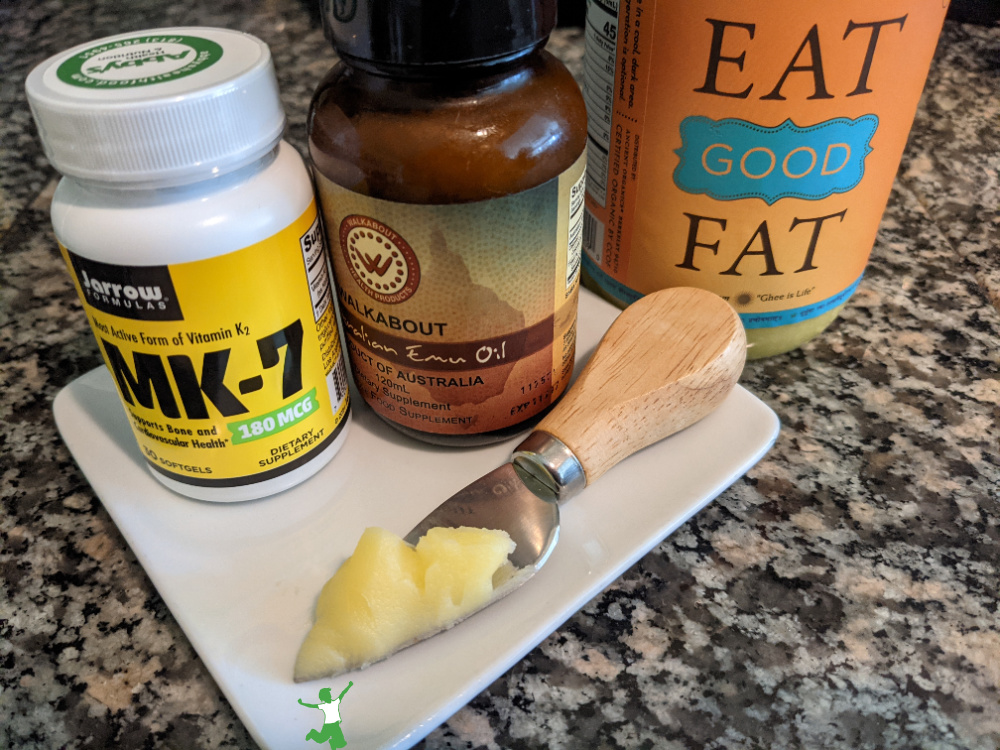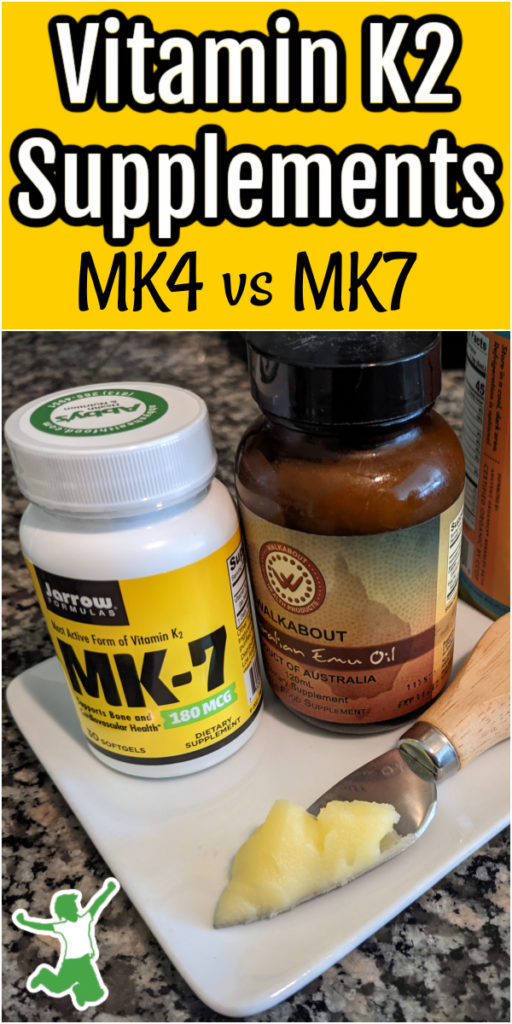Discussion of the various vitamin K2 supplements on the market with a comparison of MK-4 from animal sources or MK-7 from bacterial fermentation to ensure the diet contains sufficient amounts of this elusive yet critical nutrient.

Getting enough Vitamin K2 is absolutely essential to vibrant health. Surprisingly, the vast majority of people are seriously deficient.
Even those eating a completely whole food, organic diet, usually fall short when it comes to getting enough of either of the two major forms: MK-7 and MK-4.
Traditional Societies instinctively put great importance on foods high in Vitamin K2.
These sacred foods were consumed in larger quantities by young couples preparing to conceive.
In addition, pregnant and breastfeeding women, growing children, and the elderly received more to preserve health during these critical times of life.
Sufficient Vitamin K2 along with the other critical fat-soluble activators A and D are especially important for pregnant women to consume to ensure healthy babies.
It is important to note that Vitamin K1 from leafy greens is a different nutrient! It is not the same as Vitamin K2 found in the sacred foods of traditional cultures.
The best food sources of Vitamin K2 are grass-fed dairy products, emu oil, gouda, brie cheese, and natto, a very strong-tasting fermented soy product with roots in Japan.
Vitamin K2 from animal sources is MK-4, while K2 produced by bacterial fermentation as found in natto or cheese is MK-7.
Getting Enough Vitamin K2 in the Diet
Unfortunately, even if one consumes plenty of grass-fed dairy, getting enough K2 in the diet is still a challenge. This is due to the worrisome depletion of our soils which will take generations to repair.
Consider that the spring butter of the traditional Alpine living Swiss was an orange color. Grass-fed spring butter today is at best deep yellow.
No doubt, the soil that produced the rapidly growing spring grass that the Alpine cows grazed upon was much higher in nutrients to produce orange butter which the Swiss reverently placed in bowls with wicks to burn in their Churches.
K2 Is Not Recycled by the Body like K1
One factor contributing to widespread Vitamin K2 deficiency is the apparent lack of recycling of this nutrient by the body.
This is in contrast to Vitamin K1 from leafy green vegetables, which can be reused metabolically.
This means that Vitamin K2 stores can be quickly depleted with invisible deficiency occurring in as little as 7 days.
This is concerning especially if you are taking Vitamin D or calcium supplements. Sufficient K2 is necessary to prevent arterial calcification when the intake of these synergistic nutrients is high.
K2 Supplements Bridge the Dietary Gap
While it is always best to strive to get your nutrients from food, the critical nature of Vitamin K2 and the depletion of our soils indicates to me that supplementation is a good idea.
I did not feel certain that we could get enough K2 by eating reasonable amounts of whole and even sacred foods from grass-fed sources like Traditional Societies would have obtained by eating a similar diet.
Based on population studies and data obtained from Vitamin K2 doses given in clinical trials, it seems that 45 mcg/day would be the minimal dose needed for any sort of therapeutic effect.
Several hundred mcg/day is a better target as this is what frequent natto eaters in Japan consume.
The good news is that Vitamin K2 has no known toxicity. Thus, adding a daily supplement taken with food to improve absorption has no downside.
MK-7 vs MK-4
If you decide that taking a Vitamin K2 supplement makes sense to you, which should you choose?
If given the choice, I prefer MK-4, the animal form of Vitamin K2 over MK-7, the form of K2 from bacterial fermentation.
I get MK-4 in my diet by cooking frequently with pastured ghee, the clarified form of butter. I also eat plenty and a wide variety of cheeses along with pastured butter and eggs.
MK-4 from Food
When it comes to the animal form of Vitamin K2…MK-4…you really must get it from Real Food. The best sources are grass-fed butter, emu oil, ghee, goose liver, cheese, and pastured egg yolks.
I cannot stress enough that these are critical whole foods in your diet.
You cannot rely on a supplement form of MK-4, known as menatetrenone, because it is synthetic.
This is similar to the widespread issue of synthetic vitamin C supplements. Incidentally, folic acid is synthetic too (you want folate).
Synthetic MK-4
The supplement form of MK-4 is commonly extracted from tobacco, most likely of GMO origin (90% of tobacco crops are genetically modified).
It is not the same MK-4 as found in grass-fed butter oil, eggs, goose liver, gouda cheese, or pastured emu oil.
Supplement manufacturers rely on synthetic MK-4 because it would be prohibitively expensive to obtain this nutrient from whole food sources.
MK-4 in the Blood
Another big downside of synthetic MK-4 is the very short time it remains in the body.
For this reason, dosing every few hours is necessary to maintain therapeutic levels in the blood.
This is a very inconvenient aspect of these supplements that is rarely understood by consumers looking for therapeutic benefits.
Natural MK-7 Supplements
While MK-4 supplements are synthetic, MK-7 supplements produced via fermentation are not.
Thus, when it comes to supplementing with Vitamin K2, MK-7 is the safest and most effective form to take.
For example, this brand of Vitamin K2 is derived from nonGMO natto. My family has relied on it for many years.
If you enjoy the unusual flavor of this Japanese traditional food, I recommend natto fried rice as perhaps the best-tasting dish.
For those who are avoiding even fermented forms of soy, this Vitamin K2 from fermented chickpeas is a good brand to consider.
Blood Levels of MK-7
A huge benefit of supplementing with MK-7 is that it stays in therapeutic doses in the blood much longer than synthetic MK-4.
As a result, a once-a-day supplement of MK-7 is sufficient.
This is a very effective addition to the natural MK-4 from a diet high in grass-fed dairy and other sacred foods.
Summary. You Need BOTH MK-4 and MK-7
Getting enough of the natural, fermented form of Vitamin K2 in the diet via quality MK-7 supplements is a great strategy. To this end, I take this brand of Vitamin K2 derived from nonGMO natto.
However, it is critical to ensure you are also getting plenty of the animal form of Vitamin K2…MK-4…via whole foods.
The best MK-4 sources include cheese, pastured butter (especially ghee or raw butter oil), emu oil, goose liver, and pastured egg yolks.
Cheese from the milk of pastured cows is a particularly special source of Vitamin K2 because both MK-4 and MK-7 are in the same food!
Be sure to read labels and avoid MK-4 supplements as they are synthetic. I’ve seen at least one brand that lists menatetrenone as Vitamin K2 and not specifically MK-4, so buyer beware!
When it comes to the amount of Vitamin K2 you might need every day to maintain strong teeth, bones, and plaque-free arteries, I strongly recommend the book Vitamin K2 and the Calcium Paradox by Dr. Kate Rheaume-Bleue BSc, ND.
She discusses the daily dosage needed for healthy people versus those who need to reverse arterial calcification, osteoporosis, and other degenerative issues.

References
(1) Vitamin K2 and the Calcium Paradox by Dr. Kate Rheaume-Bleue BSc, ND
(2) Nutrition and Physical Degeneration, by Dr. Weston A. Price
(3) Menatretnone
More Information
The Latest Scoop on K2 Wonder Nutrient
The Vitamin Deficiency That Shows on Your Face
Nightshade Vegetables and Pain








brands of brie and other cheeses that are safe?
Here’s how to buy safe cheese. Only buy blocks (or wheels) among other tips. https://www.thehealthyhomeeconomist.com/aluminum-in-cheese/
I was recently diagnosed with osteopenia; and in an exercise video on YouTube, a woman commented how doing weight bearing exercises 3x a week and taking K-2 MK-7 for two years from her initial bone scan to the next had reversed osteoporosis in her spine. Thank you for your in-depth article explaining which K-2 formula is best to take and the brand you recommend.
Really appreciate this article! My husband had a heart transplant seven years ago. The medications he must take now are known to weaken bones so he was sent for a bone scan shortly thereafter, which revealed osteopenia. The doctor gave him a prescription for Fosamax. When we read the insert we were horrified at the list of possible side effects…esophageal cancer and necrosis of the jawbone, among others. Needless to say, he didn’t take it! We did some research and came across K2. Talked to his cardiologist about it. He said he’d never heard of it and cautioned him not to use it for fear of clotting problems. Understanding that k7 does not cause coagulation, he started taking it anyway and when they did another scan there was no osteopenia. His most recent heart catheterization last week looked great. Thanks, Sarah, for all the great info!
Oh my. A cardiologist who has never heard of Vitamin K2. These people are such Rockefeller robots. Sheesh. So shameful.
Thank you for sharing your experience for others to learn from and so glad to hear of your husband’s success reversing osteopenia and heart issues using Vitamin K2. No wonder they don’t teach about it in medical school (aka Rockefeller indoctrination school). They are all about Big Pharma profits and keeping people dependent on drugs for their entire lives.
Hi! Love your site. Wondering if you know of any good MK-7 products that do not use animal products (the Jarrow product states it the gelatin is “bovine gelatin”. Thanks!
I was taking MK-7 for a long time, stopped when I read synthetic vitamins and D weren’t suggested, but after reading this I just ordered it again!
I could swear I read another one of your arrivals just a few days ago about the best times of day to get adequate amounts of vitamin D, you also spoke about people on statins and I’m so upset cuz I can’t find it anywhere, is there ANY chance I could get it again? My husband is one of those that is on statins BUR he also clots, There are so many thing he can’t take it’s heartbreaking. Bid appreciate being able to read it again and I want to print it out.
Your help would be greatly appreciated
Hi Sara!
I have tried both mk-7 and mk-4 and find I get migraines from both. It starts with a feeling of having a brick in my head and I have trouble then with thinking straight. This will last for several days even after i stop taking it. I would like to figure this out because I am on a large dose of vitamin D due to MS. I suspect it may be due to my MTHFR 677T-double (homozygous) issue. I have never tried the butter oil-curious to how much I should take and if there is another way to get more vit k through food other than dairy (unfortunately I have to severely limit my dairy intake) and natto (same with fermented foods due to histamine issues). Butter oil and emu oil? how much to take? I have had trouble figuring out how much K2 emu oil has in it and also finding a reputable brand you can ingest because most sound like they are topical. Any help would be greatly appreciated. Not looking for medical advice just thoughts! Thanks!